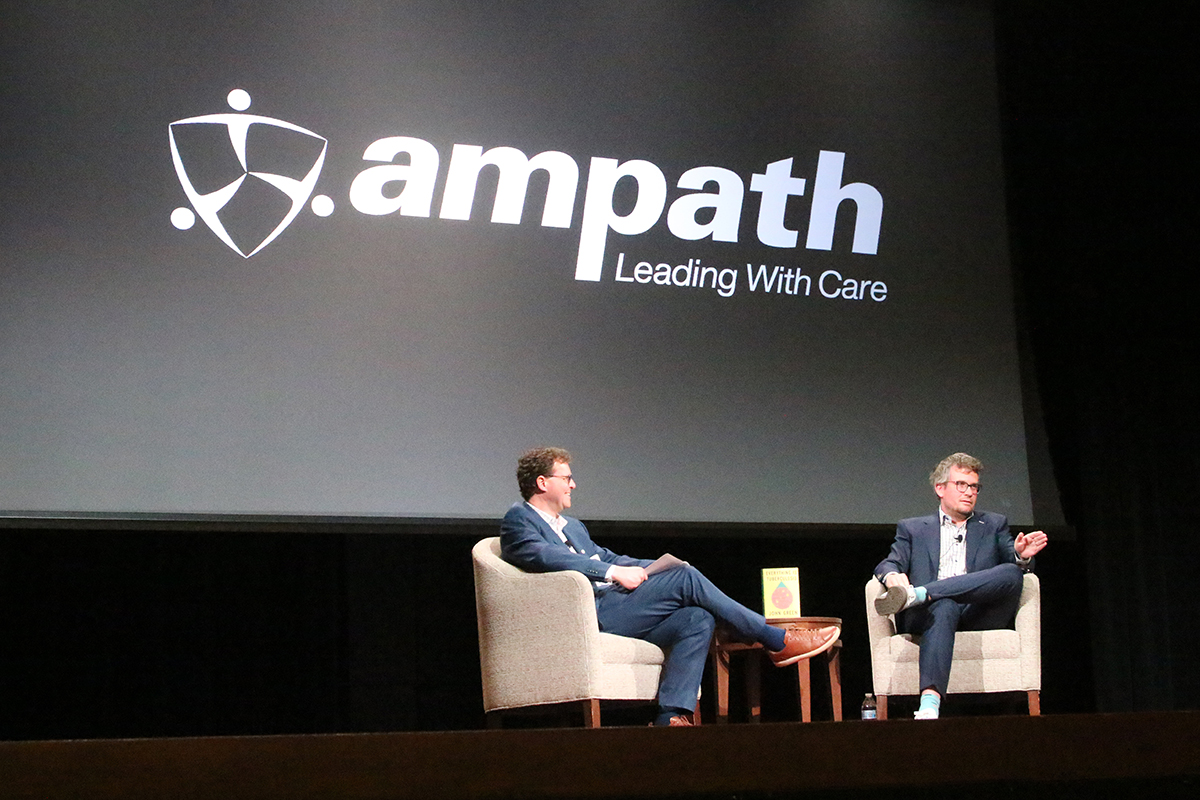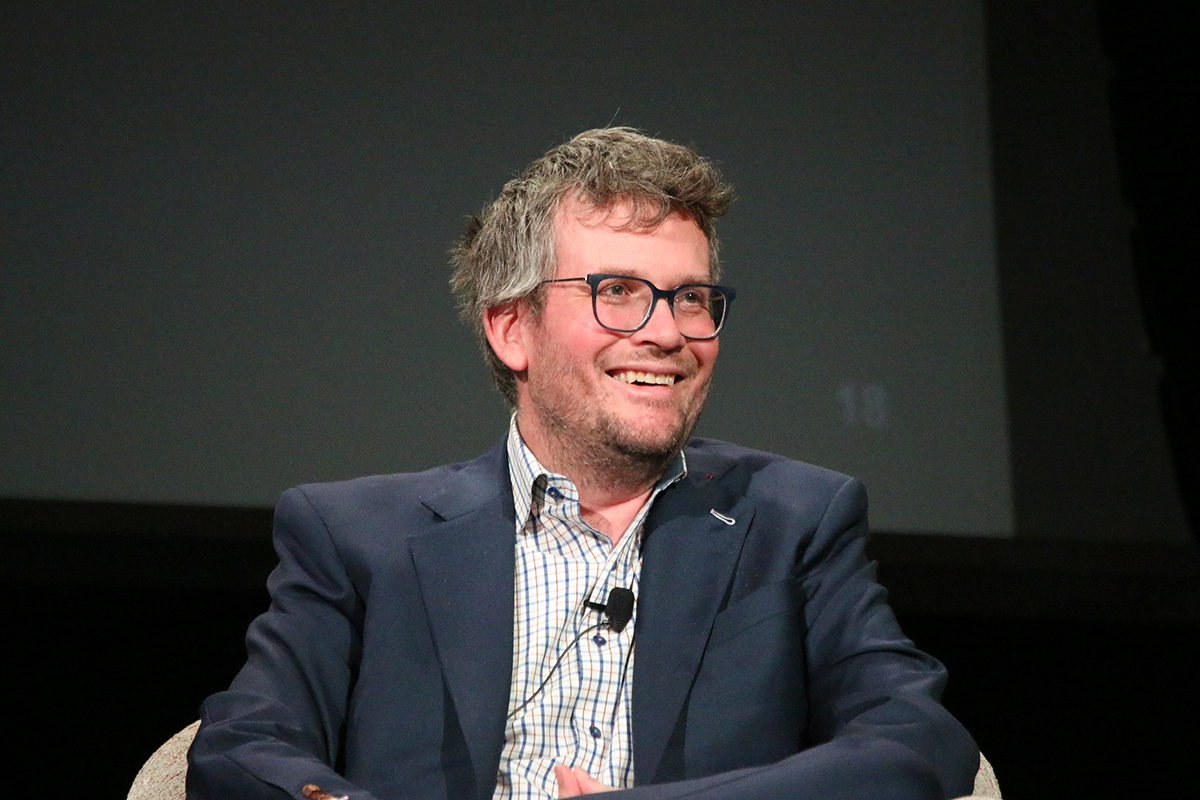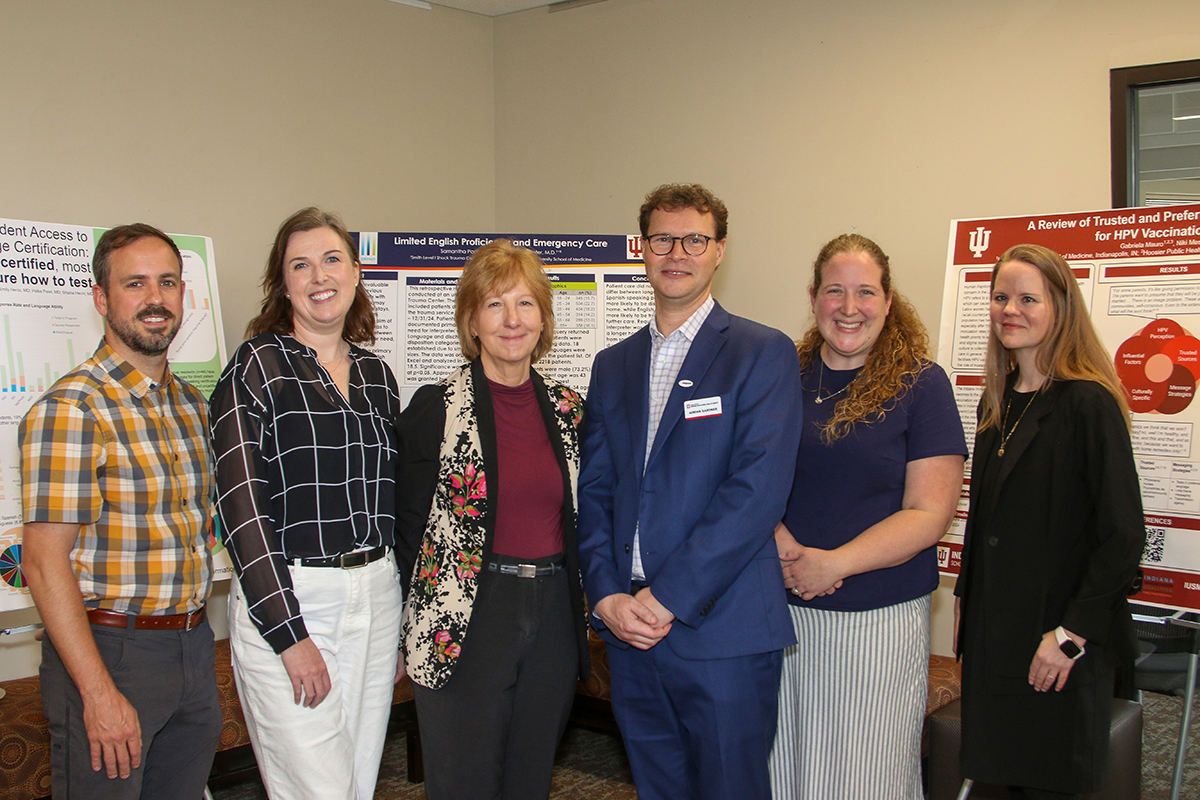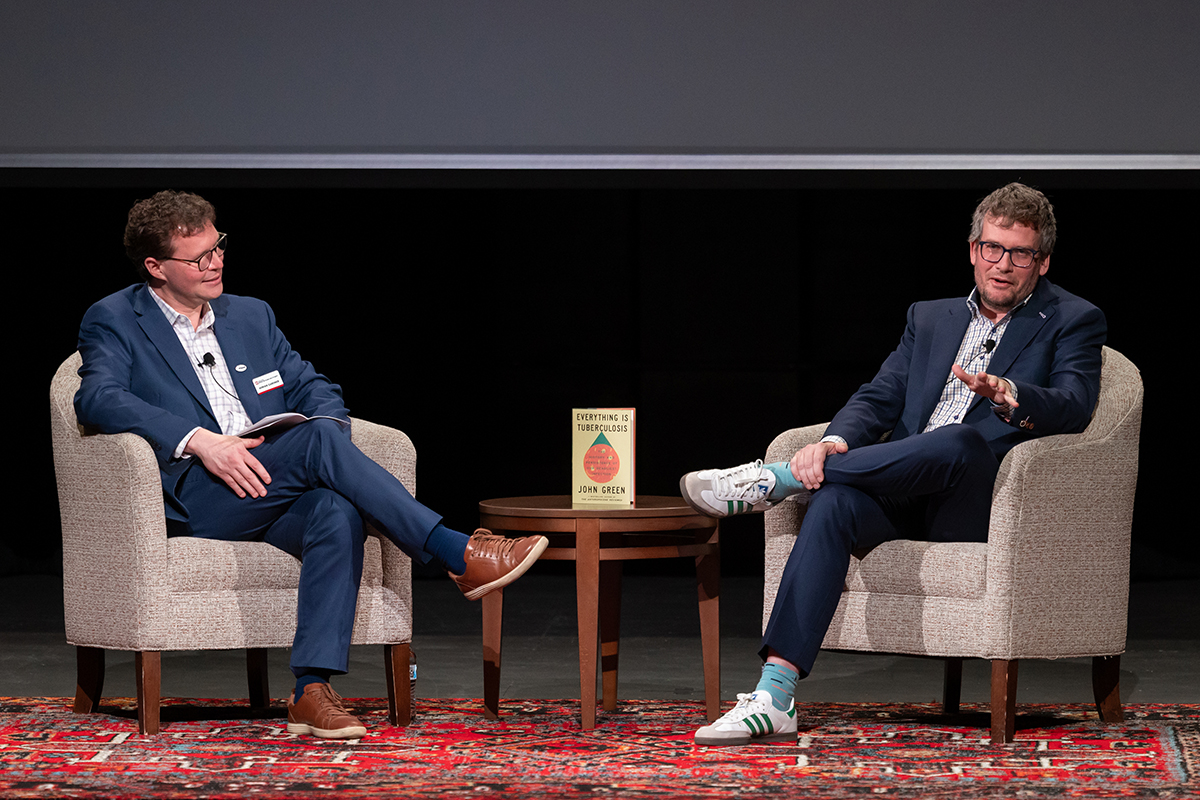“Every death from TB (tuberculosis) is optional. It's a choice that we make as a social order about where we distribute resources and who we care about and whose lives we value,” said Indiana author and philanthropist John Green during the Indiana University Global Health Scholars Day.
Green, a popular author of young adult books, recently published “Everything is Tuberculosis” and joined Adrian Gardner, MD, MPH, director of the IU Center for Global Health, in a fireside chat about the book, the disease, current global health challenges and his pride in Indiana’s leadership role in the AMPATH partnership.
Despite being an avid supporter of global health organizations, Green admitted that he had no idea that TB was still the world’s deadliest infectious disease prior to a trip to Sierra Leone in 2019 and meeting a young man named Henry who was living with TB. Henry became Green’s friend and central character of the book that weaves together the history and impact of TB with the stark reality that a disease that's been curable for 75 years is still killing people by the millions every year.

“You can't think about tuberculosis without thinking about the larger ways in which TB is infecting and affecting health care systems,” Green continued. “If you look at the map of TB prevalence in the world, you're also looking at the map of global health inequity. There's something very, very wrong with the structure that values some human lives over other human lives. TB is kind of a trojan horse to trick people into caring about TB and then once they care about TB it turns out that you have to care about the entire health care system.”
Gardner is an infectious disease doctor who practiced in Kenya for nearly 10 years as part of IU’s leadership role in the AMPATH Kenya partnership. While reading Green’s story of Henry’s experience he said, “I could see faces of people I knew who were similarly affected.” AMPATH, the Academic Model for Providing Access to Healthcare, began more than 35 years ago as a partnership between Indiana University and Moi University and Moi Teaching and Referral Hospital in Kenya. The partnership now includes 16 leading U.S. and European universities with partners in Nepal, Ghana and Mexico.
Without the privilege of traveling to Kenya or Sierra Leone, Green and Gardner discussed how to make TB’s annual death toll of 1.25 million people matter to people half a world away. Green said even if he could imagine the size of a crowd three times as big as the Indianapolis 500, “I wouldn't know what their families are like. I wouldn't know about the hole that's left by their leaving the earth. I wouldn't know about the people they love and the people they grieve for and their heartbreaks. I wouldn't know about any of that.”
“So, I don't know how you shrink that empathy gap without sending the entire U.S. population to Kenya or Sierra Leone or Nepal or wherever, but there have to be other ways because I know we have a tremendous capacity for empathy,” Green continued. By telling Henry’s story of living with TB in Sierra Leone, Green wanted to give people a single individual to focus on to understand the burden of suffering.
Green described progress against TB as a climb up stairs that began thousands of years ago and accelerated recently with shorter and better treatment regimens, advances in diagnostics and development of a possible TB vaccine for adolescents and adults.
Recent cuts to global health funding by the U.S. and other countries was like falling back down those stairs said Green. “Of the hundreds of thousands of people who've seen their treatment interrupted, it's not just that most are going to die, it's also that they're going to develop drug-resistance in many cases and spread that drug-resistant tuberculosis in their communities--not because of any failure on their part, but because of failures of resource distribution. And that's going to be a catastrophe. It's hard to overstate how bad that's going to be.”
Green believes that “if people saw the good that it (global health funding) did, if people saw the difference that it made, if people were in touch, felt proximal to the millions of lives that it saved, that would be a huge point of pride for the United States taxpayer.”
Despite the challenges, Green urged the audience of 600 healthcare providers, students and community members at the historic Madam Walker Theater in Indianapolis to remember, “This isn't the end of the story. This is the middle of the story. And we have to write a better end together. It falls to us to try to find a way through this period and to find a better end.”

Gardner added, “AMPATH has come through some rough times and picked ourselves up, learned from mistakes and figured out how to do it better and just committed to moving forward. And I think that's kind of the spirit we have to have now, too.”
Green, who moved to Indianapolis in 2007 and often shares his pride in the city through characters and settings in his fictional books, added, “I think the work that AMPATH is doing is incredibly important and a real point of pride for me living in this city. You know to say that we've really been at the center of some of the most important global health movements of the last 35 years, that's something that not every town can say, and I think it's something that we should be really, really proud of.”
“A lot of what's happened in global health in the last two decades has validated the work that AMPATH has been doing from the beginning,” he continued. “Work that's deeply, deeply embedded in a public health care system where government is a partner instead of an enemy, where ultimately the resources that are brought to bear are resources that are controlled and owned by the communities where they're working through their governments. All of that stuff has been really deeply validated by what we've learned at an academic level in the last decade or two. So, you don't just get to do cool global health work. You get to do cool global health work that's deeply aligned with what we know is most effective.”
Both Green and Gardner emphasized that the benefits to global health partnerships are reciprocal. Gardner said he was recently treating several patients recently diagnosed with TB in an Indianapolis hospital and TB cases in the U.S. are also expected to rise over the coming years. “I certainly believe we can learn lessons from our work in low-resource settings and adapt them and apply them to the challenges we have here,” said Gardner. AMPATH partners have led innovations in Kenya such as mobile x-ray trucks to diagnose TB, home-based care for patients who have drug-resistant TB, and cough monitors in healthcare facilities to help identify individuals in need of further screening.
“Something I really love in talking about the AMPATH work that you emphasize is that that we often think of like this stuff as a one-way street--like rich countries teach lessons to poor countries which is fundamentally the wrong way to think about it. It really has to be an exchange of expertise. We have so much to learn from the Kenyan health care system. We have so much to learn from the Sierra Leonean health care system. We have so much to learn about the role of community health workers about the role of last mile health,” said Green.
During the writing process, Green said he spent 5 years thinking about nothing except TB and felt sad and frustrated by the lack of attention to it. “But then the great, incredibly fulfilling thing that's emerged from the book is that I wasn't shouting into the void. I was shouting at all of y'all. And now you're kind of like shouting back. You're like, ‘I am also pissed off about this.’”
Despite recent cuts to global health funding, “I still feel kind of encouraged because I feel un-alone in my outrage,” he concluded.
The IU Center for Global Health presented Green with the 2025 Global Health Award for his significant contributions in the field of global health. Green accepted the award on behalf of his friend Henry who is unable to get a visa to travel to the U.S. “I hope someday he'll be able to, and I hope someday you'll get to meet him,” he said.
Following the fireside chat, guests learned more about various global health topics through research poster presentations from more than two dozen IU global health faculty members and trainees.
Top poster presenters were:
"Make sure you involve us" - Tuberculosis experiences and care needs among youth in East Africa--Leslie A. Enane, Lameck Diero, Winnie Muyindike, Kirsten Prabhudas-Strycker, Julia Omondi, Sylvia Kitur, Bob Ssekyanzi, MaKayla Waugh, Harold Kooreman, Suzanne Goodrich, Helen Byakwaga, Aggrey Semeere, Neelima Navuluri, Kara Wools-Kaloustian, on behalf of the East Africa International epidemiology Databases to Evaluate AIDS (EA-IeDEA) Consortium
Metabolic syndrome and memory decline: longitudinal analyses from rural South Africa-- Maria Klein, Erika Beidelman, Thomas Gaziano, Molly Rosenberg
The Growth of Emergency Medicine as a Specialty Around the World--J. Austin Lee, Brandon Friedman, Halley Alberts, Sean M. Kivlehan, Elizabeth L. DeVos MD, Andres M. Patiño




